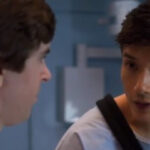“Maybe I’m nervous. Or just socially awkward. I’m still figuring myself out.” This quote, instantly recognizable to many, isn’t just relatable Instagram bio fodder. For fans of Doctor Who, these words belong to the 13th Doctor, portrayed by Jodie Whittaker, and for many, particularly those in the autistic community, they ring with profound truth. The idea of the 13th Doctor as autistic isn’t just a fan theory; it’s a perspective grounded in her on-screen actions and dialogue, offering a powerful representation for neurodivergent viewers.
One of the most endearing and relatable aspects of the 13th Doctor for autistic individuals is her unbridled enthusiasm. Much like many autistic people who find intense joy in niche interests, the 13th Doctor’s excitement is infectious, regardless of how mundane the object of her fascination might seem to neurotypical individuals. Her genuine love for a laminator, her simple pleasure in biscuits, and her passionate engagement with scientific projects – even when those projects are attached to individuals with questionable motives – showcase this trait beautifully. This unreserved passion, often misunderstood or dismissed in autistic individuals in real life, is celebrated as a core part of the Doctor’s personality.
The “purple sofa” scene is another key moment of connection. The Doctor’s almost childlike delight at the prospect of owning her own flat and a purple sofa resonates deeply with those who understand the comfort and joy found in simple, personal spaces. Her rambling, while perceived as slightly odd by her companions, is a clear example of someone attempting small talk, navigating social nuances perhaps differently, but with genuine intent. This scene highlights the Doctor’s social awkwardness, a trait she herself acknowledges, adding another layer of relatability for autistic viewers. This open admission of social awkwardness is refreshing and significant. It’s rare to see female characters, particularly in prominent roles, allowed to be eccentric and openly admit to social difficulties without it being framed as a flaw needing correction. The 13th Doctor’s quirks are not presented as something to be “fixed,” but rather as integral parts of her unique and fascinating persona.
Furthermore, the 13th Doctor’s seeming disregard for traditional gender roles is another point of connection. Her regeneration into a female body is treated with remarkable nonchalance. It’s not a defining characteristic or a source of angst; she simply is the Doctor, regardless of gender. She often forgets about it entirely, unless confronted with overt sexism. This gender neutrality aligns with the experiences of many autistic individuals who often find themselves outside of societal norms and expectations, including those related to gender.
Beneath her sometimes outwardly quirky exterior, the 13th Doctor possesses a profound empathy. However, her expression of this empathy can sometimes be unconventional, mirroring the communication styles of many autistic individuals. The scene where Graham confides in her about his fear of cancer recurrence is a powerful example. Her honest admission of not knowing what to say, initially perceived by some as coldness, is, in fact, a deeply relatable moment for autistic people. Often, autistic individuals are accused of lacking empathy precisely because their emotional expression might differ from neurotypical norms. In reality, it’s often a struggle to articulate feelings, to find the “right” words quickly enough, or even feeling emotions so intensely that it becomes overwhelming. It’s easy to imagine the Doctor, after this scene, internally processing and replaying the conversation, meticulously considering what she could have said or done to offer better comfort.
Her communication style is further highlighted in her speech about climate change. Knowing her companions seek reassurance, she delivers a stark, unfiltered truth: humanity is destroying the planet. This refusal to sugarcoat reality, to prioritize honesty over social niceties, echoes the communication style of figures like Greta Thunberg, who is also openly autistic. This directness, while sometimes perceived as blunt, stems from a place of integrity and a commitment to truth, qualities often valued within the autistic community.
The weight of past traumas, experienced by previous incarnations, is carried by the 13th Doctor. Witnessing pain and loss has led her to develop a masking mechanism, presenting a sunny and optimistic facade to the world, until the burden becomes too heavy to bear. This resonates with the masking experiences of many autistic individuals, who learn to hide their difficulties to navigate a neurotypical world, often at significant personal cost. This masking, while sometimes effective in the short term, is unsustainable, and eventually, the cracks begin to show. The Doctor’s mask begins to slip when she confronts the devastation of Gallifrey, revealing the deep emotional toll she carries.
Finally, the narrative arc of the Timeless Child offers a poignant, albeit perhaps unintentional, parallel to the experiences of autistic individuals subjected to harmful therapies. The Timeless Child’s adoptive parent’s relentless experimentation, driven by a desire to understand regeneration, mirrors the way autistic children have historically been treated as puzzles to be solved, often through questionable and damaging methods. The Doctor’s struggle to process her fragmented and manipulated past reflects the emotional turmoil faced by autistic adults grappling with the impact of childhood experiences, particularly if those experiences involved attempts to “normalize” or “cure” their autism.
The 13th Doctor, with her collection of quirks, vulnerabilities, and strengths, presents a multifaceted character that deeply resonates with autistic viewers. From her infectious enthusiasm and social navigation differences to her profound empathy and experiences with masking and trauma, she offers a rich tapestry of traits that mirror the lived experiences of many within the autistic community. For autistic Doctor Who fans, the 13th Doctor isn’t just a character; she’s a reflection, a validation, and a powerful representation within a beloved and iconic franchise. Do you see yourself in the 13th Doctor, or perhaps in another incarnation across the vast Doctor Who universe?

